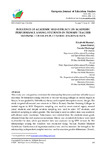| dc.description.abstract | This study was designed to determine the relationship between academic self-efficacy on academic Performance among students in teacher training colleges in central region in Kenya. It was guided by Self-efficacy theory and adopted descriptive survey design. The study targeted all second year students in Public Primary Teacher Training Colleges in central region in 2019. Purposive sampling was used to select central region, second years’ students and Simple random sampling was used to select 197 students, and stratified sampling to select gender. The instrument used to collect data was academic self-efficacy scale. Academic Performance was inferred from the students mean grade obtained from the mid-course examinations. Means and standard deviations were used to describe the data, while quantitative data was analyzed using SPSS version 26. The relationships among the variables was examined using Pearson Product Moment Correlation Coefficient and regression analysis was used to measure the strength of the relationship, independent sample t test was used to examine gender differences. Overall academic self-efficacy positively and significantly correlated with academic performance with (r =.70, p<0.01, n =197). The highest relationship was between content understanding and academic performance (r =.68, p<0.01, while the other variables measured as follows, time management (r =.63, p, <0.01), academic self-drive (r = .63; p,<0.01) and examination preparation (r =.21, p<,0.01).On regression analysis, academic self-efficacy had a significant predictive power on academic performance (F (1 195) =189.08, p<0.05). And finally, there were no significant gender differences in students’ academic self-efficacy (t=.74, p>0.5). Based on the findings it was recommended that Educators, lecturers and other education stakeholders should create an enabling environment in order to enhance students’ academic self-efficacy which is a key determinant of academic performance. | en_US |

